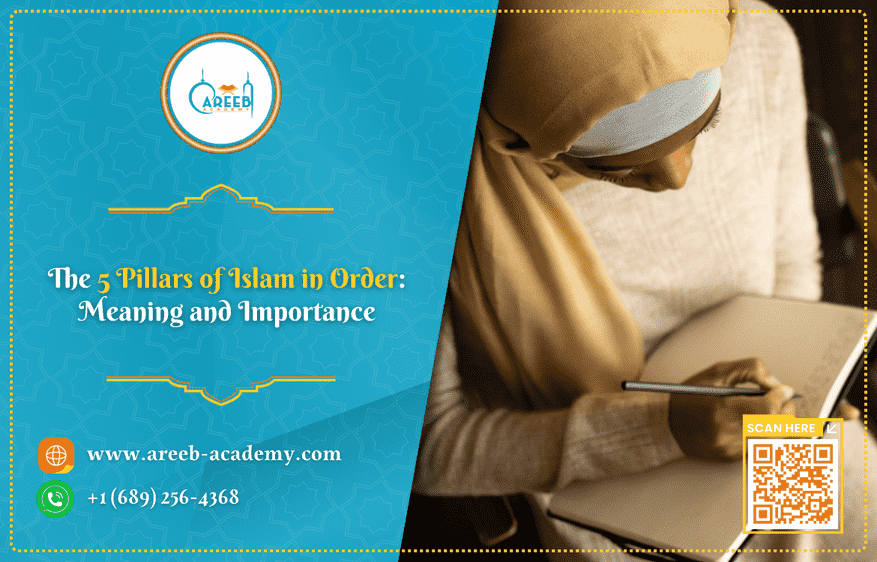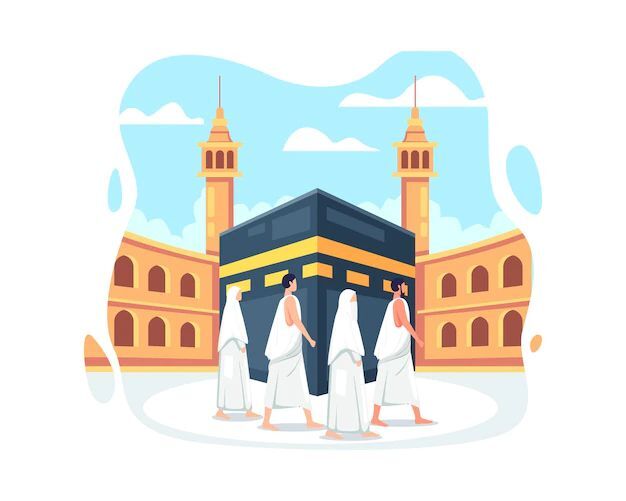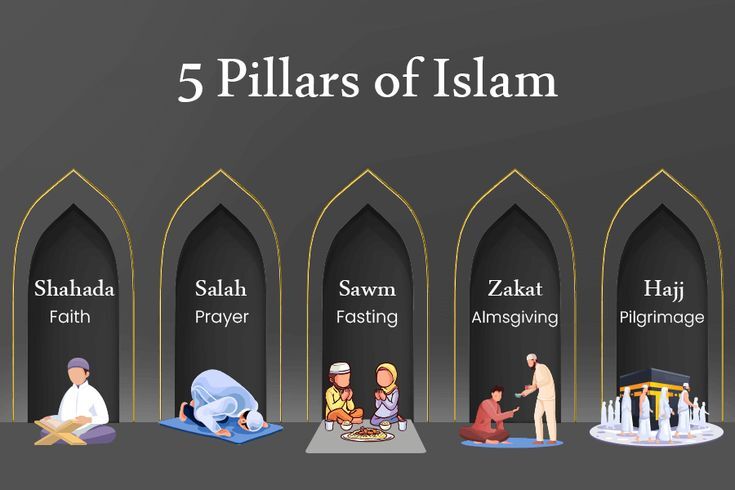
Islam is built on a strong spiritual foundation, and at the heart of this foundation are the 5 Pillars of Islam in order. These pillars represent the core beliefs and practices that every Muslim follows in their daily life. They are not just rituals, but guiding principles that shape faith, worship, character, and community.
By understanding the 5 Pillars of Islam in order, both Muslims and non-Muslims can gain a clearer picture of the religion’s essence. From the declaration of faith (Shahada) to prayer (Salah), charity (Zakat), fasting (Sawm), and pilgrimage (Hajj), each pillar strengthens a Muslim’s relationship with Allah and with society.
In this article, we explore the five pillars step by step, explain their meaning, and highlight why they form the foundation of Islam.
What Are the 5 Pillars of Islam in Order?
All Muslims must fulfil five key practices throughout their lifetime. We call these practices pillars because they form the foundation of Muslim life. The five pillars of Islam are Shahada, Salah, Zakat, Sawm, and Hajj
The 5 pillars of Islam in order are not just acts of worship but a complete framework that shapes a Muslim’s faith, daily routine, and relationship with society. By following these pillars with sincerity, Muslims strengthen their connection to Allah and embody the true spirit of Islam.
1. Profession of Faith (Shahada)

The Shahada is the first of the 5 pillars of Islam in order. Muslims declare, “There is no god but Allah, and Muhammad is the Messenger of Allah.” This statement affirms the oneness of God (Tawheed) and the finality of Prophet Muhammad ﷺ as the Messenger.
Muslims recite this phrase with full conviction to enter Islam. Artists and calligraphers often inscribe it in Islamic art, architecture, and on the Quran itself as a reminder of the core belief in monotheism.
📖 Hadith: The Prophet ﷺ said:
“Whoever says: La ilaha illa Allah (There is no deity but Allah), sincerely from his heart, will enter Paradise.”
— (Sahih al-Bukhari, 128, Sahih Muslim, 26)
2. Prayer (Salat)

The second of the 5 pillars of Islam in order is Salah (prayer), performed five times a day: at dawn (Fajr), noon (Dhuhr), mid-afternoon (Asr), sunset (Maghrib), and after dark (Isha). Muslims pray facing the Ka’ba in Mecca, either individually or in congregation.
Men must attend the Friday prayer in congregation, while women may attend if they wish but are not obligated. Each prayer includes the recitation of the opening chapter of the Qur’an (Al-Fatiha) and other verses, combined with physical movements that reflect humility and devotion to Allah.
قَالَ رَسُولُ اللَّهِ صلى الله عليه وسلم
“ الْعَهْدُ الَّذِي بَيْنَنَا وَبَيْنَهُمُ الصَّلاَةُ فَمَنْ تَرَكَهَا فَقَدْ كَفَرَ ”
📖 Hadith: The Prophet ﷺ said:
“The covenant that distinguishes between us and them is prayer; whoever neglects it has disbelieved.”
— (Sunan al-Tirmidhi 2621)
✨ Want to perfect your Salah? Read more about how to pray properly step by step in our dedicated blog post.
3. Almsgiving (Zakat)

The third of the 5 pillars of Islam in order is Zakat (obligatory charity). Allah commands Muslims to give a fixed portion (2.5%) of their wealth every year to those in need, such as the poor, orphans, and the oppressed. Zakat purifies wealth and helps reduce poverty and inequality within society.
In addition Muslims give voluntary charity (Sadaqah) at any time, seeking the pleasure of Allah, in addition to Zakat.. Historically, rulers and wealthy Muslims built mosques, hospitals, schools, and water fountains as part of their charitable contributions.
قَالَ رَسُولُ اللَّهِ صلى الله عليه وسلم
“ بُنِيَ الإِسْلاَمُ عَلَى خَمْسٍ شَهَادَةِ أَنْ لاَ إِلَهَ إِلاَّ اللَّهُ وَأَنَّ مُحَمَّدًا رَسُولُ اللَّهِ، وَإِقَامِ الصَّلاَةِ، وَإِيتَاءِ الزَّكَاةِ، وَالْحَجِّ، وَصَوْمِ رَمَضَانَ ”.
📖 Hadith: The Prophet ﷺ said:
“Islam is built on five: testimony that there is no deity but Allah and that Muhammad is His Messenger, establishing prayer, paying Zakat, Hajj, and fasting Ramadan.”
— (Sahih al-Bukhari 8)
قَالَ رَسُولَ اللَّهِ صلى الله عليه وسلم يَقُولُ “ اتَّقُوا النَّارَ وَلَوْ بِشِقِّ تَمْرَةٍ ”.
And he ﷺ said:
“Save yourself from Hell-fire even by giving half a date-fruit in charity.”
4. Fasting (Sawm)

The fourth pillar of Islam is Sawm (fasting) during the month of Ramadan, the ninth month of the Islamic lunar calendar. From dawn until sunset, Muslims abstain from food, drink, and other physical desires.
Fasting nurtures self-control, spiritual discipline, and empathy for the poor. Ramadan reminds Muslims of the blessings of Allah, including the Qur’an, which Allah revealed during this month.
قَالَ رَسُولُ اللَّهِ صلى الله عليه وسلم
“ مَنْ صَامَ رَمَضَانَ إِيمَانًا وَاحْتِسَابًا غُفِرَ لَهُ مَا تَقَدَّمَ مِنْ ذَنْبِهِ ”.
📖 Hadith: The Prophet ﷺ said:
“Whoever observes fasts during the month of Ramadan out of sincere faith, and hoping to attain Allah’s rewards, then all his past sins will be forgiven.”
وقَالَ رَسُولَ اللَّهِ صلى الله عليه وسلم “ الصِّيَامُ جُنَّةٌ، فَلاَ يَرْفُثْ وَلاَ يَجْهَلْ، وَإِنِ امْرُؤٌ قَاتَلَهُ أَوْ شَاتَمَهُ فَلْيَقُلْ إِنِّي صَائِمٌ. مَرَّتَيْنِ، وَالَّذِي نَفْسِي بِيَدِهِ لَخُلُوفُ فَمِ الصَّائِمِ أَطْيَبُ عِنْدَ اللَّهِ تَعَالَى مِنْ رِيحِ الْمِسْكِ، يَتْرُكُ طَعَامَهُ وَشَرَابَهُ وَشَهْوَتَهُ مِنْ أَجْلِي، الصِّيَامُ لِي، وَأَنَا أَجْزِي بِهِ، وَالْحَسَنَةُ بِعَشْرِ أَمْثَالِهَا ”.
And he ﷺ said:
“Fasting is a shield; so when one of you is fasting, he should not use obscene language or raise his voice in anger. If someone insults him, let him say: I am fasting.”
5. Pilgrimage (Hajj)

The final of the 5 pillars of Islam in order is Hajj (pilgrimage) to Mecca. Every Muslim who is physically and financially able must perform Hajj at least once in their lifetime.
Hajj takes place in the month of Dhul-Hijjah and includes rituals such as circling the Ka’ba (Tawaf), standing at Arafat, and stoning the pillars symbolizing Satan. The pilgrimage represents unity, humility, and submission to Allah.
قَالَ سَمِعْتُ النَّبِيَّ صلى الله عليه وسلم يَقُولُ “ مَنْ حَجَّ لِلَّهِ فَلَمْ يَرْفُثْ وَلَمْ يَفْسُقْ رَجَعَ كَيَوْمِ وَلَدَتْهُ أُمُّهُ ”.
📖 Hadith: The Prophet ﷺ said:
“Whoever performs Hajj for Allah’s pleasure and does not have sexual relations with his wife, and does not do evil or sins then he will return (after Hajj free from all sins) as if he were born anew.”
— (Sahih al-Bukhari 1521)
And he ﷺ said:
“Hajj is Arafah.”
Why the 5 Pillars of Islam in Order Are Important

The 5 pillars of Islam in order form the foundation upon which every Muslim builds their faith. These pillars do not stand as isolated acts of worship. Instead, they work together to nurture belief, strengthen discipline, promote justice, and unify the Muslim community. Each pillar supports the others and ensures that a Muslim’s faith lives not only in the heart but also in action and character.
By practicing these pillars, Muslims bring the essence of Islam—submission to Allah (SWT) and living in peace with others—into their daily lives.
1. Shahada (Profession of Faith)
- The Shahada is the first of the 5 pillars of Islam. It lays the foundation of belief. When a Muslim declares, “There is no god but Allah, and Muhammad is His Messenger,” they confirm Tawheed (monotheism) and belief in the final messenger. Without this testimony, the other pillars lose their meaning. Faith must be firmly rooted before actions carry weight. The Shahada shapes a Muslim’s identity and reminds them of their purpose: to worship Allah alone.
2. Salah (Prayer)
- Why It’s Important:
Prayer is performed five times daily, providing Muslims with regular opportunities to reconnect with Allah (SWT). Prayer prevents forgetfulness of God in the midst of worldly life. It strengthens the bond between the Creator and the servant. Prayer also promotes discipline, humility, and unity—especially in congregation. There, rich and poor, leaders and workers, stand shoulder to shoulder as equals.
3. Zakat (Almsgiving)
- Why It’s Important:
Zakat ensures that wealth is purified and redistributed to those who need it most. By giving 2.5% of their annual savings, Muslims protect themselves from greed and selfishness. At the same time, they help the poor, orphans, and vulnerable members of society. Zakat builds social solidarity, reduces inequality, and reminds Muslims that wealth is a trust from Allah, not just a personal possession.
4. Sawm (Fasting in Ramadan)
- Why It’s Important:
Fasting during Ramadan teaches Muslims self-control, patience, and gratitude. By abstaining from food, drink, and desires during the day, Muslims are reminded of their dependence on Allah and the blessings He provides.
Fasting also fosters empathy with the poor and hungry, encouraging generosity and compassion. Spiritually, it purifies the soul and brings Muslims closer to Allah (SWT).
5. Hajj (Pilgrimage)
- Why It’s Important:
Hajj is a once-in-a-lifetime obligation for those who are physically and financially able. During Hajj, Muslims from all over the world gather in Mecca, wearing simple garments that erase social and economic differences.
This powerful experience reinforces the equality of all believers before Allah and symbolizes unity, humility, and submission. It serves as both a spiritual renewal and a reminder of the Day of Judgment.
The 5 Pillars of Islam in Order and Their Connection to Daily Life

The 5 pillars of Islam are not limited to occasional rituals. They influence every part of a Muslim’s life. The Shahada establishes the foundation of belief and guides choices, values, and identity. Salah (prayer) weaves worship into daily life, pausing worldly matters five times a day to reconnect with Allah. Prayer brings discipline, mindfulness, and peace into everyday activities.
Zakat (almsgiving) teaches Muslims that wealth is a trust from Allah. It ensures compassion and generosity become part of daily life, not only through obligatory giving but also through voluntary acts of kindness.
Sawm (fasting) during Ramadan reshapes the daily routine. It instills self-control, gratitude, and empathy for the less fortunate. These lessons extend beyond the holy month, encouraging patience and mindfulness throughout the year.
Hajj (pilgrimage) may be performed once in a lifetime. Its lessons of equality, humility, and submission to Allah serve as reminders that all humans are equal before their Creator. Hajj encourages fairness and humility in everyday life.
Together, these five pillars work in harmony to ensure that faith is not only a matter of belief but a lived reality, integrated into every moment of a Muslim’s life. They transform ordinary routines; eating, working, praying, giving, and socializing into acts of worship, making Islam a way of life centered on peace, devotion, and submission to Allah.
Misconceptions About the 5 Pillars of Islam in Order
The 5 pillars of Islam in order are often misunderstood, especially by those who are less familiar with the faith. While they are simple in practice, their meaning is profound, and misconceptions usually arise from reducing them to outward actions without understanding the spiritual depth behind them.
For example, the Shahada (declaration of faith) is sometimes thought to be only words recited, when in fact it requires sincere belief in the heart and a way of life shaped by that conviction.
Salat (prayer) is occasionally viewed as just a set of movements repeated daily, yet in reality, it is a direct connection with Allah (SWT), a reminder of purpose, and a practice that unites Muslims in community and discipline.
When it comes to Zakat (charity), some assume it is optional or can be given without rules, but in truth it is an obligation with clear guidelines, ensuring wealth reaches those truly in need.
Sawm (fasting in Ramadan) is often misunderstood as merely avoiding food and drink. Its true purpose is to develop self-restraint, purify the soul, and foster empathy for the poor.
Similarly, Hajj (pilgrimage) is sometimes seen as only for the wealthy. In reality, it is required only for those who are physically and financially able. Hajj removes worldly differences and reminds all Muslims that everyone is equal before Allah.
These misconceptions highlight the importance of seeing the five pillars not as empty rituals, but as acts that shape belief, character, and community. By correcting these misunderstandings, one can better appreciate Islam as a faith built on peace, submission, and balance in daily life.
Teaching Children the 5 Pillars of Islam in Order

Teaching children about the 5 pillars of Islam in order can often be challenging. These are the foundations of faith, and while simple in words, their depth and importance require careful explanation. Children may find it difficult to fully grasp concepts like Shahada, Salah, or Zakat if they are not taught in a way that is engaging, age-appropriate, and accurate. That’s why having qualified teachers who understand both the subject and the needs of young learners is essential.
At Areeb Academy, we specialize in teaching the Quran, Islamic Studies, and Arabic (Fusha) to learners of all ages—children, teenagers, adults, and even new Muslims who want to start their journey with a solid foundation. With our one-on-one sessions, your child (or even you!) can learn in a personalized, supportive, and interactive environment that makes these important lessons both engaging and easy to follow.
Start today with a free trial session, and experience how Areeb Academy can help you or your child build a stronger connection to Islam. After the trial, you can easily subscribe to continue the learning journey at your own pace.
FAQs
Q1: What are the 5 Pillars of Islam in order?
The Five Pillars are: Shahada (Declaration of Faith), Salah (Prayer), Zakat (Charity), Sawm (Fasting), and Hajj (Pilgrimage). These pillars are the foundation of a Muslim’s belief and practice.
Q2: Why is it important to learn the 5 Pillars from a young age?
Because they shape the identity of a Muslim from the very beginning. Children who understand the meaning and importance of these pillars grow with stronger faith and clearer values.
Q3: Is it difficult to teach kids the 5 Pillars of Islam?
Yes, sometimes it can be challenging for parents to explain such deep concepts in a simple way. That’s why many families choose to rely on professional teachers who know how to make lessons engaging, fun, and accurate.
Q4: How does Areeb Academy help in teaching the 5 Pillars of Islam?
At Areeb Academy, we offer one-on-one sessions with experienced teachers who know how to simplify Islamic concepts for all ages. Whether it’s kids, teenagers, adults, or new Muslims, our programs make learning easy and interactive.
Q5: Can adults or new Muslims join too?
Absolutely! Our sessions are not only for children. We welcome new Muslims who want to learn the foundations of Islam step by step, as well as adults who wish to refresh their knowledge or improve their Arabic and Quran recitation.
Q6: How can I start learning with Areeb Academy?
You can begin with a free trial session to see how our teaching style fits your needs. After that, you can subscribe and continue your learning journey at your own pace.


